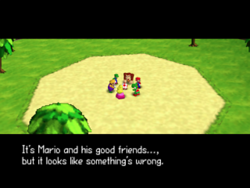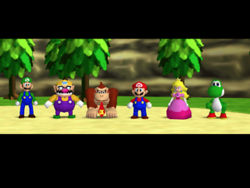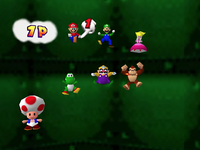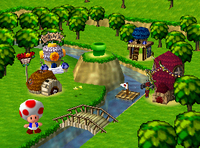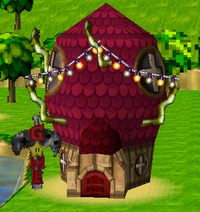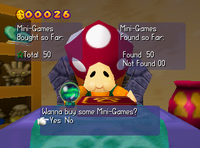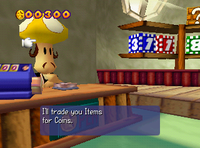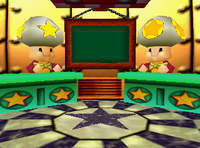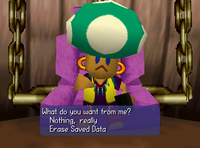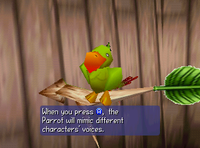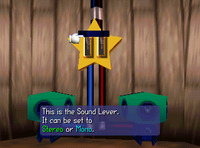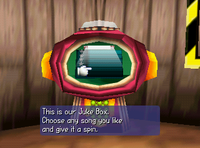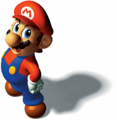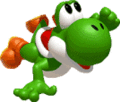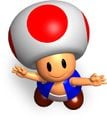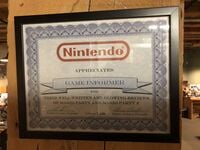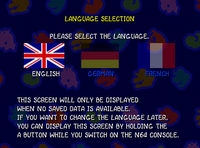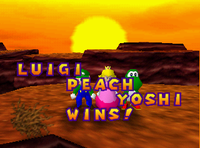Mario Party
- This article is about the Nintendo 64 game. For the video game series as a whole, see Mario Party (series). For the lenticular jigsaw puzzle, see Mario Party (lenticular jigsaw puzzle).
| Mario Party | |||||||||||||
|---|---|---|---|---|---|---|---|---|---|---|---|---|---|
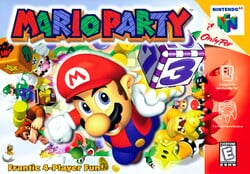 For alternate box art, see the related gallery. | |||||||||||||
| Developers | Hudson Soft CAProduction | ||||||||||||
| Publisher | Nintendo | ||||||||||||
| Platforms | Nintendo 64 Nintendo 64 - Nintendo Classics | ||||||||||||
| Release dates | Nintendo 64: Nintendo 64 - Nintendo Classics: | ||||||||||||
| Languages | English Japanese French (Europe) German | ||||||||||||
| Genre | Party | ||||||||||||
| Ratings |
| ||||||||||||
| Modes | Single-player, multiplayer | ||||||||||||
| Format | Nintendo 64:
Nintendo Switch: | ||||||||||||
| Input | Nintendo 64: Nintendo Switch: | ||||||||||||
| Serial codes | |||||||||||||
- “Frantic 4-Player Fun!”
- —Slogan
Mario Party is a party game released for the Nintendo 64 as the first installment in the titular Mario Party series. Players select one of six Super Mario characters and move around the board, collecting Coins and various other items to help themselves or hinder others in their quest to collect Stars. Players participate in Mini-Games after each turn, in which they compete for extra Coins. These Mini-Games vary widely, from free-for-alls to pairs to three-on-ones. They test players' reflexes, puzzle-solving skills, and even luck. Certain Mini-Games allow players to steal Coins from each other, while others grant the winner five Coins from their rivals. Dueling Mini-Games in later installments would serve a similar purpose. This game is known for pioneering an iconic and renowned series in the Super Mario franchise, which continues to this day, becoming one of the most well-known series in gaming.
While Mario Party was never re-released on any Virtual Console, it saw its first re-release on the Nintendo 64 - Nintendo Classics service in November 2022, releasing alongside Mario Party 2.
Story[edit]
The story begins with Mario and his friends standing around and arguing over who is the Super Star, the superior one among them. To sort things out amongst members of the gang, Wario theorizes that a Super Star must be strong. Donkey Kong abruptly agrees, while bragging about his strength. An argument and fight ensue between the two, with Luigi finding himself quite literally stuck in the middle. It is also suggested that Mario would make a good superstar, or Princess Peach, or even the energetic Yoshi.
The gang begins to close in on Toad, who jumps and shouts out that he has an idea of what they should do. Arguing that being a Super Star takes not only strength, but also courage, wisdom, and kindness, he suggests that the crew take the Warp Pipe in Mushroom Village, and find out who is the Super Star of their adventures. Though he warns them that the path will be dangerous, all six of the competitors race toward the Pipe and enter it one by one, thus beginning the game itself.
Characters[edit]
Playable[edit]
The game features a total of six playable characters, all controlled and played identically to one another. Wario is referred to as one of Mario's friends, being the first time he is referred to as such. Each character has a color they are assigned to in certain mini-games, such as the balls in Bumper Balls, the pumps in Balloon Burst, or the skateboards in Skateboard Scamper.
Character descriptions are taken from the instruction booklet.[11]
| Character | Associated color | Manual description |
|---|---|---|
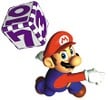 Mario |
Red | Everyone would agree that Mario is a super guy, but he certainly can't match the strength of Wario or Donkey Kong. Can he overcome his weaknesses to become the number one Superstar? |
 Luigi |
Blue | Maybe Mario's younger brother has what it takes to become the ultimate Super Star. He's smarter than Mario, but can brains overcome brawn in this contest? |
 Peach |
Pink | Princess Toadstool has been antagonized by Bowser for ages. Perhaps her proven bravery will allow her to reign as the supreme Super Star. |
 Yoshi |
Green | Yoshi has adventured with Mario since he was a baby. Full of energy and rich with experience, perhaps Yoshi has what it takes to achieve Super Stardom. |
 Wario |
Purple | He's certainly more cunning than the rest and strong to boot. Could it be that Wario is destined to become the Super Star? |
 DK |
Brown | DK is definitely the most powerful of all his friends. if the contest relies on muscle, this ape will win hands down. |
Game modes[edit]
Game modes are selected from a "Map" screen, Mushroom Village, that the player is led to upon starting the game. Each building or feature represents a mode, and the player can select one to play a certain mode.
Listed below are the available areas for the player to access in Mario Party:
Party mode[edit]
Party mode is the heart of Mario Party. Four players will play on a board game, each getting a turn to roll the 1-10 Dice Blocks, which will determine how many spaces they will move across. Depending on what items are enabled, the 1-10 Dice Block can be replaced with another Dice Block with its own unique effects. Players will try to collect Coins by landing on helpful spaces and triggering board events. When a player passes by the Star Space, they can purchase a Star for 20 Coins.
After everyone rolls, a roulette will appear which will randomly select a Mini-Game to play. Whether the Mini-Game is a 4-Player Mini-Game, 2-vs-2 Mini-Game and 1-vs-3 Mini-Game depends on the type of space each player landed on. If all players landed on a Blue Space or Red Space, a 4-Player Mini-Game is chosen; if it is a split between two Blue Spaces and two Red Spaces, a 2-vs-2 Mini-Game is chosen; and if one player is on a Blue or Red Space while the other players are on the opposite space, a 1-vs-3 Mini-Game is chosen. If a player lands on a Happening Space, the space color will be randomly selected to either blue or red before a Mini-Game is chosen. Whichever team or player wins the Mini-Game is rewarded with Coins. Some Mini-Games will also take away Coins from other players or teams if they lost (making this the only Mario Party game where players can lose Coins in standard end-of-turn Mini-Games, outside of Mini-Games where Coins are wagered). This process will repeat itself until the set number of turns (20, 35 or 50) is up.
After the last turn, Bonus Stars are awarded to players based on the following criteria:
- Game Star: Most Coins earned in Mini-Games
- Coin Star: Most Coins collected in one board game
- Happening Star: Most Happening Spaces landed on
The winner will be determined by who had the most Stars. If two or more players share the same number of Stars, Coins will be used as the tiebreaker. If two or more players share the same number of Coins and Stars, a dice roll will be made where the higher-rolling player wins.
Boards[edit]
Mario Party features a total of eight boards, which remains the highest number of main party mode boards in a Mario Party game.
| Board | Description | Difficulty | |
|---|---|---|---|
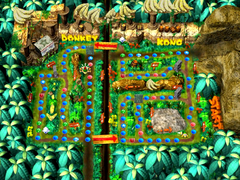
|

|
DK's Jungle Adventure features a mysterious treasure that is locked away in the jungle's ancient ruins. Three Whomps are guarding the junctions; to pass, a player must pay 10 Coins. Landing on a Happening Space triggers a rolling boulder which, in turn, chases down any players standing in its way to the path near the start of the board. If a player happens to meet Bowser on this board, they are "awarded" a useless Golden Bowser Statue and are forced to pay him 10 Coins. | |
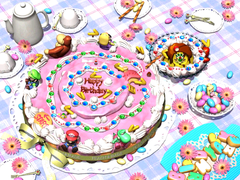
|

|
Peach's Birthday Cake is the smallest map of the ones available in Mario Party. Its main feature is the Flower Lottery, hosted by Goomba, where a player plants a red, blue, yellow, or green seed (at the cost of 10 Coins) and grows a flower. Three flowers have a Toad face, while one flower has a Bowser face on it. After all four seeds are planted, four new ones can be chosen. This is run by a Goomba, who says if a player gets the Bowser face, they will go to Bowser, who will sell him the Bowser Cake (one of Bowser's bogus items) for 20 Coins. If a player gets a Toad face, they will go in the direction of the Star. If a player lands on a Happening Space, they have the opportunity to plant a "Strawberry Seed" at the cost of 30 Coins, which grows into a Piranha Plant. Once planted, if another player with stars lands on the Happening Space with the Piranha Plant there, it will steal a Star from that player, and give it to the player that planted it. | |
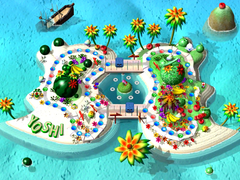
|

|
Yoshi's Tropical Island consists of Watermelon Island, Cantalope Island, and a small island in the middle; it was said that many Yoshis live here, but only two are shown in the middle of the board. A Pink Yoshi is on the small island, surrounded by whirlpools, while a Blue Yoshi is unable to help. Players aim to collect stars to get rid of the whirlpools and reunite the two Yoshis. The Happening Spaces make Bubba the fish take Toad to the opposite island, Bowser taking his place. Bowser sells defective Bowser Tubes to players for 30 Coins. Two Thwomps block both ways to the opposite island, and request fees from players if they want to pass. The fee always starts at one Coin but goes up by one Coin each time until it reaches the limit of 50 Coins to pass. | |
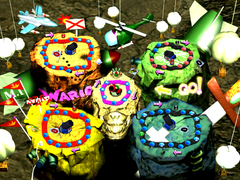
|

|
Wario's Battle Canyon is split into four areas with Bowser's area in the middle. Players aim to collect Stars to stop the feud between the Bob-omb Buddies and the Bob-ombs. To get around the board, players are placed into cannons and fired to another area, which is determined by a spinning wheel. If a player lands on a Happening Space, the Bob-ombs will switch the directions of the cannons. Bowser's area can only be accessed by paying 10 Coins to the Fly Guy in the northeast area, who will carry the speaking character to him. Bowser also has a cannon in this area to replace his bogus item. However, instead of firing at a specific part of the board, Bowser will just fire a character at a random spot. | |
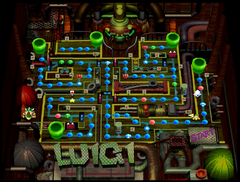
|

|
Luigi's Engine Room features an engine in the middle of the room, which is actually located in the back of the playing board. The main feature is the board-wide system of red and blue doors: one set rises up to block specific paths while the other set goes down to open other paths. The doors switch at the start of every turn, when players land on certain Happening Spaces, or if a robot on the board is paid 20 Coins to switch them. Happening Spaces on steam generators near the engine make steam rise out of the respective generator, propelling players to a higher section. Players that go to Bowser will see his "Make As Many Coins As You Want Mecha" in action. They will get a Coin from Bowser at the cost of 20 Coins. No matter where the players go, all paths end in Warp Pipes that lead to Boo, who is near the start. | |
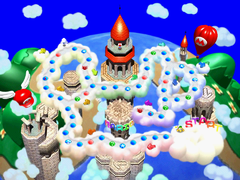
|

|
Mario's Rainbow Castle is placed on clouds with multiple towers and is sky-themed. The main feature of this board is that the location of the Star does not change each time a player receives one. Instead, it is always located on the main tower of the map. Each time a player does receive a Star, however, the tower rotates, revealing Bowser. When the player reaches the tower while Bowser is there, he charges 40 Coins for a Ztar. Unlike their later appearances, they do not affect the Star count, merely serving to waste the 40 Coins. The tower can also be rotated by any player landing on a Happening Space. | |
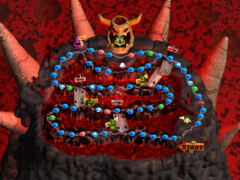
|

|
Bowser's Magma Mountain takes place on the summit of a gigantic volcano. The main feature of the board involves various stone heads that offer shortcuts throughout the board for 10 Coins. If the player accepts, a roulette block will appear containing either Bowser's face or a Star. If the latter is hit, the player is allowed to take the shortcut. However, if they choose Bowser's face, the player is forced to continue on their original path. Eventually, the player will reach a purple-colored Stone Head, who will offer the same roulette block, except free of charge. This time, however, if the player selects Bowser's Face, they will automatically follow a path directly to Bowser, who will steal 20 Coins or a Star (depending on the roulette) from the player. This board is only available if bought for 980 Coins and after all other boards are played at least once. If the player lands on a Happening Space, Bowser's volcano will erupt, turning all Blue Spaces into Red Spaces. | |
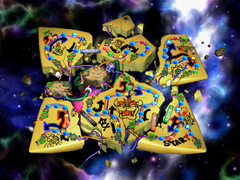
|

|
Eternal Star is unlocked by collecting 100 Stars and completing all the boards at least once. On this space-themed board, Koopa Troopa is kidnapped at the very beginning of the game by Bowser, and players move around the star using warp stations and must retrieve Stars from seven Baby Bowsers. Upon reaching a Baby Bowser, players must pay their 20 Coins and roll higher than him to get a Star. The player's Dice Block can roll 8-10 but Baby Bowser's can roll any number. If the player wins, they get a Star, but if they lose, they lose a Star. In the center of the star is Bowser, who takes a Star from the player who reached him (or 20 Coins if they do not have any Stars), sending them back to the start and changing the routes of the Warp Machines. If a player lands on any Happening Space, Bowser will send everyone back to start, though the Warp Machine routes remain unchanged. | |
Spaces[edit]
| Image | Space | Description |
|---|---|---|

|
Blue Space | Players gain three Coins from landing on this. The amount of Coins received is doubled in the Last Five Turns Event. This space is the most common space on all boards. |

|
Red Space | If a player lands on this space, they lose 3 Coins. The amount of Coins lost is doubled during the Last Five Turns Event. |

|
Happening Space | When a player lands on this space, an event happens. The event that happens depends on the board. |

|
Chance Time Space | A player that lands here plays a Chance Time game. The player hits three blocks, which identify two players and what one gives to the other. Game-changing events can happen here, from trading Stars or Coins, to giving one Star or 10-30 Coins to someone else. |

|
Minigame Space | A player that lands here plays a One-Player Mini-Game. If the player wins the Mini-Game, they receive Coins. If they lose, then the player loses 5 Coins. If the game is a bonus Mini-Game though, the player is rewarded the amount of Coins collected, but not lose any if they get none. |

|
Mushroom Space | A roulette block appears if a player lands on this space. Either the player can receive a Mushroom, which gives the Player the chance to roll another Dice Block, or receive a Poison Mushroom, which forces them to forfeit their next turn's Dice Block roll. |

|
Bowser Space | Any player who lands on this space will meet Bowser, who triggers a roulette. The roulette can cause a player to lose a substantial amount of Coins, play a Mini-Game to not lose Coins, restistribute everyone's Coins equally, play a rigged version of Chance Time where a player loses 10-30 Coins to Bowser, or be promised a large reward only for Bowser to run and do nothing. |

|
Star Space | When a player passes here, they can obtain a Star only if they have at least 20 Coins. The Star Space does not count towards the player's movements, unlike other spaces. On most boards, the player can purchase a Star for 20 Coins from Toad or decline, but will not be able to purchase one if they have 99. However, on Eternal Star, the player needs to duel Baby Bowser to get a Star. If the player loses, Baby Bowser will take a Star away from the player. If the player has 99 stars, they will not duel. |
Mushroom Village[edit]
Mini-Game House[edit]
The Mini-Game House is located to the right side of the river, and resembles a mushroom with a large, red cap.
Free Play[edit]
The Free Play wall allows the player to access all Mini-Games they have unlocked so far and can play them as many times as they like for free.
Toad[edit]
The resident Toad of the Mini-Game house is an elderly-looking one named Puff who has a large red cap on her head, similarly shaped to the Mini-Game House itself. By speaking to her, the player is given a list of Mini-Games that have been played in the game so far. There are various price ranges for Mini-Games. Once one is bought, it can always be played for free via the orb on the table.
Pot o' Skills[edit]
The Pot o' Skills leads to the Mini-Game Stadium. The Mini-Game Stadium has its own board shaped in the form of a Star, and only has 24 total spaces. Each turn, players roll the dice and advance the number of spaces, like in Party Mode. However, Blue Spaces do not add Coins and Red Spaces do not subtract Coins. All Coins are gained or lost from Mini-Games which are played at the end of each turn. There is a One-Player Mini-Game space as well. Passing Koopa will result in 10 Coins for the player. At the end of the game, the player with the most Coins wins.
Mushroom Shop[edit]
The Mushroom Shop is run by the Mushroom Shop clerk and is located on the left side of the river on the map; it resembles a brown mushroom on its side. In the shop, various items can be bought with Coins earned from Mini-Games and Party games. Here is a listing of every item, along with its price and in-game description.
| Image | Name | Price | In-Game Description | Notes |
|---|---|---|---|---|

|
Plus Block | 200 Coins | This appears randomly, and you get the number of coins shown. | |

|
Minus Block | 100 Coins | This appears randomly, and you lose the number of coins shown. | |

|
Speed Block | 200 Coins | This appears randomly, and only numbers eight to 10 will appear on the block. | |

|
Slow Block | 100 Coins | This appears randomly, and only numbers one to three appear on the block. | |

|
Warp Block | 200 Coins | This appears randomly, and players change positions on the board. | |

|
Event Block | 200 Coins | This appears randomly, and Boo, Koopa Troopa or Bowser will appear. | |

|
Mecha Fly Guy | 100 Coins | This counts how many times you rotate the Control Stick. Use it in the Mini-Game House. | |

|
Record | 50 Coins | This is the Record for the Juke Box in the Option House. | |

|
Talking Parrot | 50 Coins | This Parrot is good at mimicking characters' voices. It lives in the Option House. | |

|
Lucky Box | 400 Coins | Get 10 percent interest on Coins you collect with this Lucky Box. | |

|
Casino Box | 300 Coins | Bet your Coins with this Box to get double or half of what you actually collected. | |

|
Magma Mountain | 980 Coins | This will let you go to the hidden board map of Magma Mountain. | |

|
Credits | 100 Coins | This lets you see the End Credits and the names of people who made the game. | Complete the Eternal Star map to obtain this. |
| No Koopa | 500 Coins | Koopa Troopa won't appear on the map, but it won't work on some maps. | Complete the Eternal Star map to obtain this. | |
| No Boo | 500 Coins | Boo won't appear on the map, but it won't work on some maps. | Complete the Eternal Star map to obtain this. | |

|
Gameballs | 300 Coins | This has many Gameballs with Mini-Games inside. What you get is a surprise. | This item appears after at least 30 mini-games have been bought from the Mini-Game House and can be used until all mini-games are bought. |
Mushroom Bank[edit]
The Mushroom Bank is where players can store their Coins as well as Stars and items. The bank is run by the two Mushroom Bank Toads.
Porto[edit]
Porto sits behind the left counter and is in charge of storing the items the player buys at the Mushroom Shop until they are used during a game. Here is also where the player can choose how they want to save their Coins, whether with the Coin Box, Lucky Box, or Casino Box.
Stats-tracking Toad[edit]
The other Toad sits behind the right counter and keeps track of the total Coins and Stars the player has saved up. He also keeps track of how many more Stars need to be collected, out of 100, to unlock the Eternal Star map.
Option House[edit]
The Option House is a mushroom-resembling blue-topped toward the top of the map across the river. As the name suggests, it is used to adjust the multiple options for the game. There are other features such as the Talking Parrot and Juke Box as well.
Toad[edit]
The resident Toad of the Option House, whose name is Fun Gus, can delete all saved data. Once spoken to and asked to delete all data, he takes out a remote and opens an electrical box on the other side of the house. The cover will open revealing a large red switch, and the player is asked if they are sure about deleting their data. Once the player accepts deleting the data, they should either press ![]() to press the switch and erase all data, or press
to press the switch and erase all data, or press ![]() to cancel the process.
to cancel the process.
Talking Parrot[edit]
The Talking Parrot is an item that can be bought from the Mushroom Shop, and once bought, will appear on a perch in the Option House. By pressing the ![]() button, the parrot speaks various voices from various characters in the game randomly. Two lines of dialogue were edited from the Japanese version to remove religious references, which were Luigi and Wario exclaiming "Oh my God!" after suffering misfortune. These voices include:
button, the parrot speaks various voices from various characters in the game randomly. Two lines of dialogue were edited from the Japanese version to remove religious references, which were Luigi and Wario exclaiming "Oh my God!" after suffering misfortune. These voices include:
- Boo
- Bowser
- DK
- Koopa Troopa
- Luigi
- Mario
- Peach
- Toad
- Yoshi
- Wario
- The "narrator" voice that announces events in Mini-Games such as "Time Up!", "Game Over!", "Draw!", etc.
Sound Lever[edit]
The Sound Lever is a lever that changes the sound from Mono to Stereo or vice versa. There are two speakers at the bottom with pipes leading up the lever. By pulling the lever down, one of the speakers is deactivated and the sound is changed to Mono. There is no surround sound.
Juke Box[edit]
The Juke Box allows the player to listen to any song from the game. The only prerequisite is that the player must have heard the song in the game itself before it becomes available on the Juke Box. The Juke Box becomes available for use after the player buys the Record from the Mushroom Shop for 50 Coins. For PAL and Japanese players, an extra song is available entitled "Move to the Mambo!", which is unavailable in the American version.
Mini-Game Island[edit]
Mini-Game Island is a special challenge in which the goal is to travel all around the island and beat every Mini-Game one by one. After beating every Mini-Game and reaching the end, Toad will challenge the player once more to a race against him and two other CPUs in Slot Car Derby. This mode is for one player only. Completing the mode will reward the player with the Bumper Ball Maze Mini-Game, which can be accessed in the Mini-Game House.
Mini-Games[edit]
- Main article: List of Mario Party minigames
Quotes[edit]
- Main article: List of Mario Party quotes
Staff[edit]
- Main article: List of Mario Party staff
Pre-release and unused content[edit]
- Main article: List of Mario Party pre-release and unused content
Glitches[edit]
Eliminated players remaining in Mushroom Mix-Up[edit]
In Mushroom Mix-Up, usually the eliminated player will be carried away by a Blooper. However, if one player stomps on another player while the mushroom platforms sink and causes them to fall into the water while managing to reach the non-sinking platform, the Mini-Game ends as usual, but the eliminated player may be seen remaining in the water without the Blooper's appearance. This situation happens especially when only two players remain or the Mini-Game lasts for an extended period of time.[citation needed]
Platform Peril softlock[edit]
In Platform Peril, if the winning player's path is blocked when the Mini-Game ends, the Mini-Game will continue indefinitely, softlocking the game.[12]
Gallery[edit]
- For this subject's image gallery, see Gallery:Mario Party.
Multimedia[edit]
- For the complete list of media files for this subject, see Multimedia:Mario Party. For this subject's sound test, see Juke Box.
| File info 0:30 |
| File info 0:30 |
| File info 0:30 |
| File info 0:30 |
Reception and legacy[edit]
Mario Party received mostly positive reviews from critics. The most frequent criticism Mario Party received was the slow pacing and lack of enjoyment without multiplayer. GameSpot explains "The games that are enjoyable to play in multiplayer are nowhere near as good in single-player mode. Really it's that multiplayer competitive spark of screaming at and/or cheering for your friends that injects life into those often-simple little games and without it, they're just simple little games." IGN took a similar line, saying that it was the interaction between players rather than the interaction between the game that made Mario Party fun. Another common criticism was the game's dependence on luck rather than skill, though this was seen by many to add to the game's board game atmosphere, as players who were comfortably in the lead one turn could be losing the next.
In contrast, gaming magazine Game Informer viewed the game with much contempt.[13] All three reviewers note that the minigames are boring and those playing will not derive much enjoyment. Out of the three reviewers, Paul Anderson was the most charitable and gave the game an overall score of 5.5/10. However, he says the game is worthless and only serves to fill the first quarter of the year. Nintendo of America sent the magazine a sarcastic certificate over the publication's negative review of Mario Party and its sequel.[14] From then on, Game Informer became infamous for their constantly negative reviews of the Mario Party games, which usually get a positive reception from critics such as IGN and GameSpot, and their picky reputation has stuck since.
| Reviews | |||
|---|---|---|---|
| Release | Reviewer, Publication | Score | Comment |
| N64 | Andrew Reiner, Game Informer | 2.25/10 | "I stepped up to this review as a video game veteran, ready for anything. I've played every single N64 title out there, and have seen many sights and sounds. But even with this experience behind me, I wasn't prepared for what lurked within this N64 release. No game has assaulted me with this kind of ferocity, and no game has taken as many jabs below my belt as Mario Party. It seriously hurts to play this title. And no, it's not designed specifically for children. Even the kiddies will find Mario Party and its plethora of Mini-Games to be extremely boring and more of a chore than anything else. Heck, if I was a kid again, I'd run from this game like I would a spanking. As a matter of fact, I'd probably bite my lip and take the spanking rather than play this god-awful game again." |
| N64 | Peer Schneider, IGN | 7.9/10 | "Mario Party is an excellent party game for four people and we suggest everyone out there with three friends should own it (unless your three friends own it). But be prepared to spend at least an hour for a game and do a lot of waiting for the other players. Had the overall speed of gameplay been faster (especially when playing against computer players), Mario Party would have scored higher in our final review score. Still, this is probably one of the best "virtual board games" I have ever played and the inclusion of the many Mini-Games makes this one of the few ones that couldn't have been done better outside of a game console." |
| N64 | Joe Fielder, GameSpot | 7.2/10 | "Mario Party is intended to be played with a group of friends, and for those people who can really take advantage of that, this game is a must-buy. The less-social gamer might want to rent." |
| Aggregators | |||
| Compiler | Platform / Score | ||
| Metacritic | 79 | ||
| GameRankings | 78.02% | ||
Sales[edit]
Mario Party is the 17th best-selling game for the Nintendo 64, selling approximately 2.7 million copies: 1.23 million copies in North America, 870,000 copies in Japan, and 580,000 copies elsewhere.[citation needed]
Legal issues[edit]
- Main section: List of controversies § Mario Party injuries
Nintendo gave away a free Mario Party glove for a time after the game's release, the reason being that many players got blisters and other ailments on the palms of their hands due to the Mini-Games that involve spinning the ![]() around as fast as possible, which are Tug o' War, Paddle Battle, and Pedal Power (this was likely why Mario Party was not released on the Virtual Console, but Mario Party 2 was). Nintendo suggested that the players should use the thumb to spin the Control Stick, but this method is a lot slower than rotating with the palm, and the thumb can slip off the joystick. Receiving the glove required proof of purchase of the first game of the series. The glove giveaway did not surface until after the release of Mario Party 2. This was because Nintendo lost a class-action lawsuit that was filed by several families of the injured players and had to pay several thousands of dollars in damage reparations as a result. As a consequence of unbalanced difficulty and self-injury, as well as the Control Stick's high potential for decalibration through this method, there were no more Mini-Games after Mario Party that involved spinning the Stick as fast as possible until Mario Party: Island Tour was released since the analog stick on the Nintendo 3DS made it safe to spin quickly without injuries.
around as fast as possible, which are Tug o' War, Paddle Battle, and Pedal Power (this was likely why Mario Party was not released on the Virtual Console, but Mario Party 2 was). Nintendo suggested that the players should use the thumb to spin the Control Stick, but this method is a lot slower than rotating with the palm, and the thumb can slip off the joystick. Receiving the glove required proof of purchase of the first game of the series. The glove giveaway did not surface until after the release of Mario Party 2. This was because Nintendo lost a class-action lawsuit that was filed by several families of the injured players and had to pay several thousands of dollars in damage reparations as a result. As a consequence of unbalanced difficulty and self-injury, as well as the Control Stick's high potential for decalibration through this method, there were no more Mini-Games after Mario Party that involved spinning the Stick as fast as possible until Mario Party: Island Tour was released since the analog stick on the Nintendo 3DS made it safe to spin quickly without injuries.
In Mario Party Superstars, there is also a warning in place for the Tug o' War and Cast Aways Mini-Games for players not to use their palms while playing the Mini-Game, referencing the issue. A similar warning appears for the Nintendo Switch Online version of Mario Party when starting the game.
Regional differences[edit]
Differences exclusive to the Japanese version[edit]
In the Japanese version, Wario and Luigi say "Oh my God!" when they lose or otherwise suffer misfortune. This was changed in the Western versions to remove religious references;[15] Luigi wails in pain instead, and Wario says "So ein Mist!" (the voice clip for which was taken from Mario Kart 64 and slowed down), which is a German expression of disgust, similar to "Oh, shoot!" or "No way!".[16]
| File info 0:02 |
| File info 0:02 |
Differences exclusive to the American version[edit]
The song "Move to the Mambo!" is not used in the American release, but is used in the Japanese and European/Australian releases. The song is used in two of the Mini-Games, Balloon Burst and Musical Mushroom.[17]
Differences exclusive to the European version[edit]
Exclusive to the European release is a language select, which allows the game to be played in English, German, or European French. The screen first appears when turning on the game for the first time and will only be forced to appear again if ![]() is held down before turning on the console.
is held down before turning on the console.
References to other games[edit]
- A segment of the "Ground BGM" is arranged and incorporated into the music for the board Peach's Birthday Cake.
- An arrangement of "Ground BGM" plays during the tutorial for Mini-Games.
- Some songs are rearrangements of some world map themes from the game.
- "Slowly, Slowly" is based on "World 6 Map (Ice Land)".
- "Dodging Danger" is based on "World 8 Map (Dark Land)".
- The opening theme sounds similar to the Mario's Pad theme.
- Part of the music of Bowser's Magma Mountain is a rearrangement of the first Bowser's Keep theme.
- Peach's Birthday Cake is based on Princess Peach's letter that she baked a cake for Mario, and the layout of the board and background surrounding it are based on the photograph after the credits.
- Mario's Rainbow Castle board is based on the secret course Tower of the Wing Cap, and the Wing Cap is used as a prop on his board map, and finally, the board game's ending cutscene is based on another secret course Wing Mario Over the Rainbow.
- The ending cutscene for Luigi's Engine Room has the board reveal itself to take place inside a flying ship much like the Rainbow Cruiser from the course Rainbow Ride, though however with a completely different design.
- The Cheep Cheep in Yoshi's Tropical Island takes its English name from Bubba from Tiny-Huge Island.
- Mario's title screen (if he wins the board game under the title of being a Superstar) depicts him with the Wing Cap flying with the other playable characters.
- In the minigame Face Lift, the logo in the background reads "Super Bowser 64".
- Wario's Battle Canyon features a feud between the Red Bob-ombs and Black Bob-ombs similar to Bob-omb Battlefield.
- A Mario Star sign appears on both courses of Slot Car Derby.
- Yoshi's Tropical Island is seemingly based on this game due to it having fruits from said game.
References in other media[edit]
- Twenty-one minigames from Mario Party were used in this game.
- Some of the returning 4-Player minigames were reworked into 2 vs. 2 and Battle minigames.
- Bombs Away, Face Lift, Shy Guy Says, Piranha's Pursuit, Tug o' War, and Desert Dash all return as playable minigames.
- Just like in this game, the player faces Toad in a round of Slot Car Derby in Minigame Island mode.
- The opening cutscene of this game is a reference to that of Mario Party, with the starting camera angle also being similar.
- The Yoshi's Tropical Island and Peach's Birthday Cake boards return, along with 12 minigames.
- The settings for the game's menus are also the same, with the Mushroom Village (now named the Village Square) returning for the main menu (with minor differences, such as Koopa Troopa replacing Toad in the Warp Pipe).
- The music for these locations and minigames also return as new arrangements.
- The theme of Wario's Battle Canyon is arranged in the song "Blue Shelled."
- Mario's Rainbow Castle returns as a board.
- Treasure Divers returns as it was originally, Platform Peril returns, now as a coin minigame; and Bumper Balls returns, under a new cloud look, and acts as the second round of Mario's Three-peat.
- Shy Guys have an attack based on Shy Guy Says, where they hold flags with either Mario or Luigi's emblems and force them to react accordingly.
Names in other languages[edit]
| Language | Name | Meaning | Notes |
|---|---|---|---|
| Japanese | マリオパーティ[18] Mario Pāti |
Mario Party | |
| Chinese (Simplified) | 马力欧派对[19] Mǎlì'ōu Pàiduì (Mandarin) Máhlihk'āu Paaideui (Cantonese) |
Mario Party | |
| Chinese (Traditional) | 瑪利歐派對[20] Mǎlì'ōu Pàiduì (Mandarin) Máhleih'āu Paaideui (Cantonese) |
Mario Party |
Notes[edit]
- This is the only Mario Party to have no entirely luck-based Mini-Games.
- This was originally the only Mario Party game to have a title screen that changes; namely, depending on which character wins a board, except for Mini-Game Stadium. This concept returns in Mario Party Superstars, with the title screen changing depending on the last board played.
- Respectively, in Bombsketball and Tug o' War, if two or three players win, the winning text will be shown with a grammatical error, with the singular "wins" being used instead of the plural "win" or the past tense "won". This was fixed in subsequent games.
- This is the only Super Mario game on the Nintendo 64 to have a sequel be released on the same console, let alone two.
- On page 21 of the game's instruction manual, the description for Koopa Troopa Space explains, "When you want save your game, stop on this space and press the A Button.". The sentence is missing a "to" between "want" and "save".
References[edit]
- ^ マリオパーティ. Nintendo (Japanese). Retrieved June 21, 2024.
- ^ Nintendo. N64 Game List. Nintendo of America (American English). Archived January 16, 1999, 22:31:01 UTC from the original via Wayback Machine. Retrieved January 13, 2025.
- ^ a b IMDb.[better source needed]
- ^ https://www.nintendo.com/en-za/Games/Nintendo-64/Mario-Party-269569.html
- ^ @NintendoAmerica (November 1, 2022). "Face your friends and family in a contest of strength, wits, and agility in #MarioParty and Mario Party 2, now available on #NintendoSwitch for #NintendoSwitchOnline + Expansion Pack members! #Nintendo64". X (American English). Retrieved July 4, 2024.
- ^ @Walfashito (November 1, 2022). "Recuerden que ya están disponibles Mario Party 1 y 2 en el #Nintendo64 #NintendoSwitchOnline , el 2 está en completo español, y en cuanto al infame minijuego de rotar la palanca del primero, sigue estando ahí, eso sí, con una advertencia al iniciar el juego xD #NintendoSwitch". X (Mexican Spanish). Retrieved July 4, 2024.
- ^ November 2, 2022. 11月2日より「NINTENDO 64 Nintendo Switch Online」に『マリオパーティ』『マリオパーティ2』が追加。当時のゲーム誌「64DREAM」の記事情報も公開。. Nintendo (Japanese). Retrieved November 3, 2022.
- ^ @NintendoEurope (November 2, 2022). Gather friends and family for bizarre boards and madcap minigames! The #Nintendo64 classics Mario Party and Mario Party 2 are now available with #NintendoSwitchOnline + Expansion Pack.. X. Retrieved November 3, 2022.
- ^ @NintendoAUNZ (October 20, 2022). Get ready to party like it’s 1999! #Nintendo64 classics Mario Party and Mario Party 2 join the #NintendoSwitchOnline + Expansion Pack festivities on 02/11!. X (Australian English). Retrieved October 20, 2022.
- ^ 任天堂(香港)有限公司 (October 21, 2022). 【香港資訊】 只要加入「Nintendo Switch Online + 擴充包」便能遊玩的《Nintendo 64™ - Nintendo Switch Online》11月2日起新增遊戲《瑪利歐派對》《瑪利歐派對2》。 #NintendoSwitchOnline. Facebook. Retrieved March 7, 2025.
- ^ https://www.gamesdatabase.org/Media/SYSTEM/Nintendo_N64//Manual/formated/Mario_Party_-_1999_-_Nintendo.pdf PDF of Mario Party 1 Manual
- ^ Snooplax (October 21, 2019). Softlocking Every Mario Party for Nintendo 64. YouTube. Retrieved June 21, 2024.
- ^ March 1999. Game Informer #71. Page 36.
- ^ Ryckert, Dan (September 18, 2000). Replay - Mario Party 3. Game Informer. Archived September 13, 2016, 10:34:33 UTC from the original via Wayback Machine. Retrieved June 21, 2024.
- ^ https://www.youtube.com/watch?v=bqQlJjwPubU
- ^ https://www.youtube.com/watch?v=2hcU8Yrqlqk
- ^ https://www.youtube.com/watch?v=45u6OCYCrSI
- ^ Japanese logo
- ^ June 16, 2021. E3发表的Nintendo Switch游戏软件最新资讯公开! 多款支持中文作品预定发售!. Nintendo HK (Simplified Chinese). Retrieved June 16, 2021.
- ^ 瑪利歐歷史|超級瑪利歐兄弟 35週年|任天堂. Nintendo of HK (Traditional Chinese). Retrieved June 21, 2024.
External links[edit]
| Nintendo 64 games | |
|---|---|
| Super Mario franchise | Super Mario 64† (1996) • Mario Kart 64† (1996) • Mario no Photopi (1998) • Mario Party (1998) • Mario Golf (1999) • Mario Artist: Paint Studio* (1999) • Mario Party 2 (1999) • Mario Artist: Talent Studio* (2000) • Mario Artist: Communication Kit* (2000) • Mario Tennis (2000) • Paper Mario† (2000) • Mario Artist: Polygon Studio* (2000) • Mario Party 3 (2000) • Dr. Mario 64† (2001) |
| Donkey Kong franchise | Diddy Kong Racing (1997) • Donkey Kong 64 (1999) |
| Yoshi franchise | Yoshi's Story† (1997) |
| Crossovers | Super Smash Bros.† (1999) |
